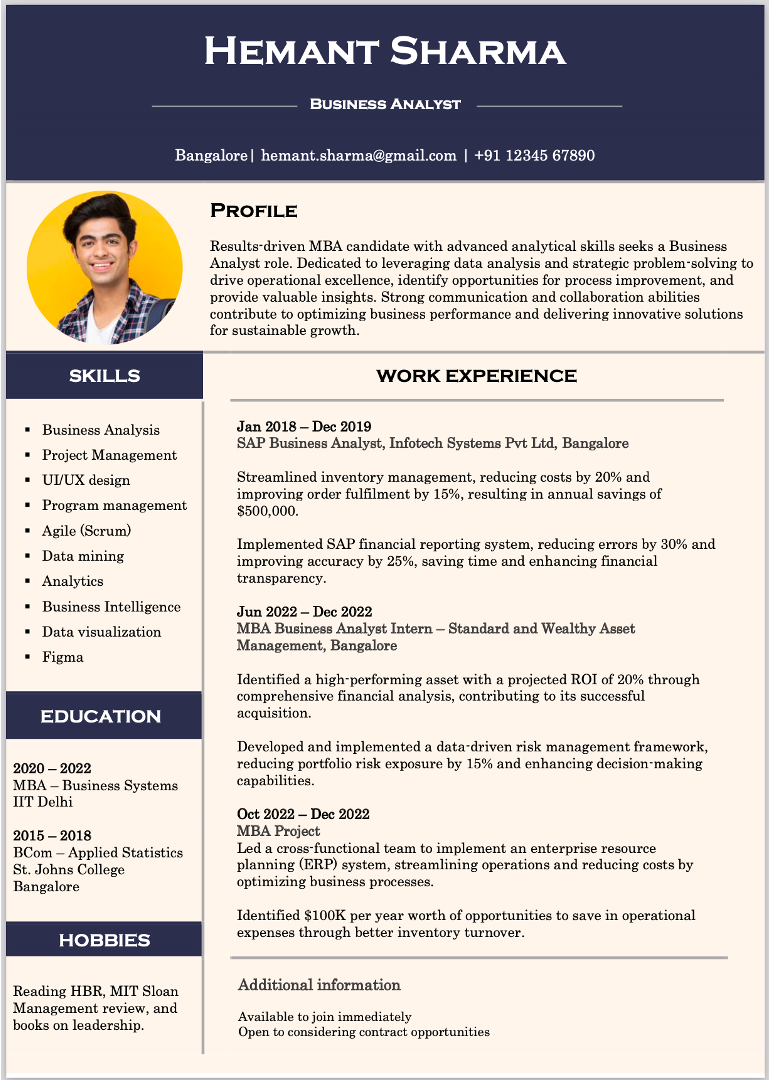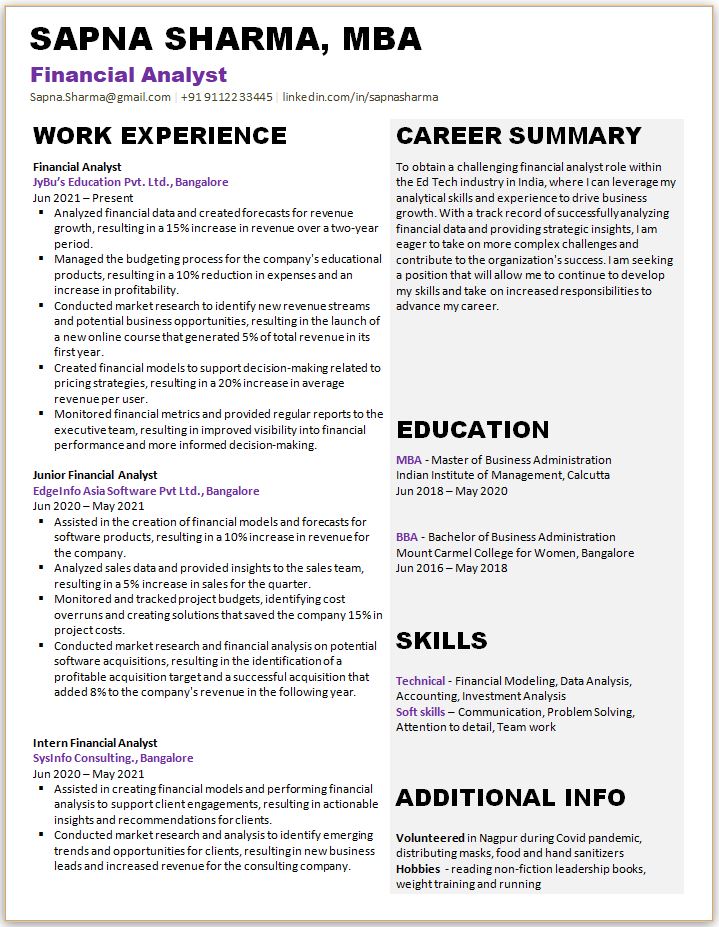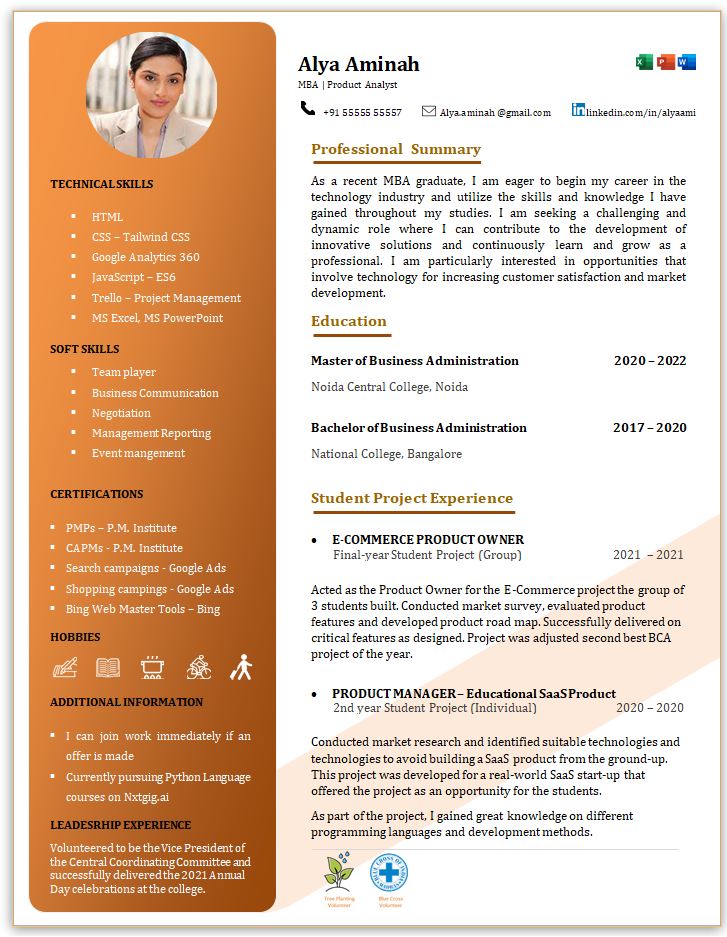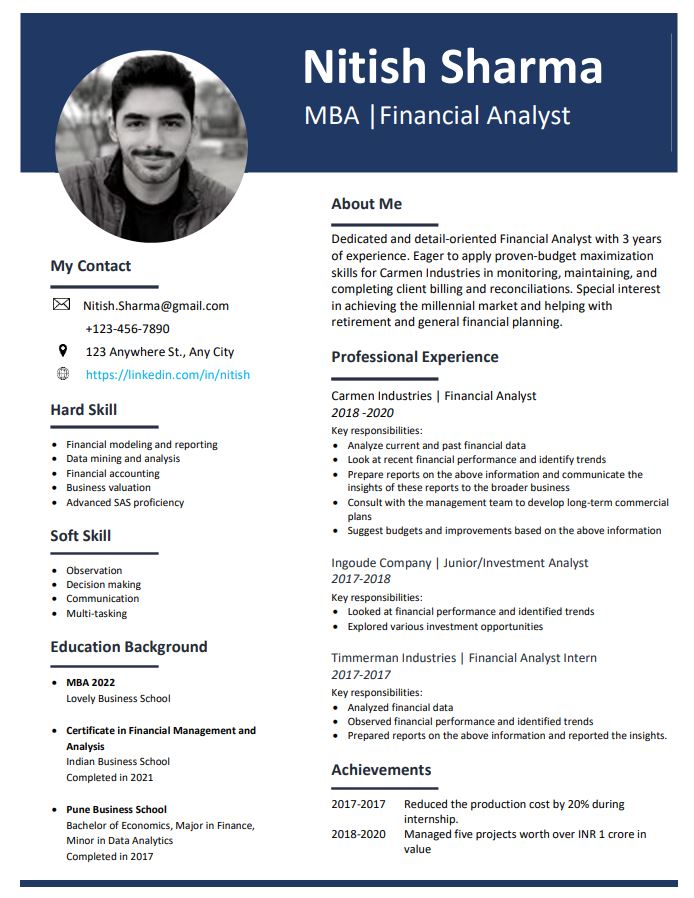100 Essential Skills to put on your resume to stand out
(+ free examples)

25 Jun 2023

100 Essential Skills to put on your resume to stand out [For most jobs]
Skills is one of the most important sections on any resume for both fresh graduates and the experienced professionals. Crafting the skills section professionally and strategically can be one of the most significant steps you would have taken in your attempt to stand out to your potential employer. Despite the criticality of the skills section, many fresh college graduates and experienced professionals seldom spend the time and effort required to make the most of the skills section.
As you know, your resume serves as a gateway to new career opportunities, making it crucial to present your skills in a clear and impactful way. When hiring managers review your resume, they look for specific skills that align with the requirements of the job. By strategically highlighting your skills, you can stand out from the competition and increase your chances of landing interviews.
You could be thinking, wait – I have a bunch of skills and I am just going to include in my resume. What is the big deal? Well, including the skills might seem very obvious and an easy task on the surface, but it requires some strategic application of mind and a little bit of authentic scrutiny to come up with the list of skills that you want to list on the resume.
In this article, we will explore the art of skill inclusion on your resume and provide valuable insights to help you craft a compelling skills section. Whether you're a recent graduate entering the job market or a seasoned professional looking to advance your career, mastering the presentation of your skills can make a significant difference.
So, this is what we will show you through ample examples in this article.
- The types of skills to include
- How to structure your skills section effectively
- Provide practical tips to make your skills shine
- How to tailor your skills to match the job requirements and showcase your unique strengths
By the end of this article, you'll have a clear understanding of how to strategically present your skills on your resume, making it a powerful tool that captures the attention of hiring managers and opens doors to exciting career opportunities.
So, let's dive in and unlock the secrets of skill inclusion to create a resume that showcases your capabilities and lands you the job you desire.
Hard Skills Vs Soft Skills – What is the difference?
This one often confuses a lot of job seekers. Some questions that could be in your mind are
- What are the basic differences between these two skills
- Should I include both hard and soft skills
- Whether hard skills are technical skills or the soft skills are technical skills
In today's competitive job market, it's essential to understand the distinction between hard skills and soft skills. While both types of skills play a crucial role in professional success, they differ in nature and impact. Whether you're crafting your resume, preparing for an interview, or seeking career development opportunities, knowing the difference between hard skills and soft skills can give you a competitive edge.
What are Hard Skills
Hard skills are also known as technical skills, refer to specific knowledge and abilities that are teachable and measurable. These skills are typically acquired through formal education, training programs, or practical experiences.
Hard skills are often job-specific and directly related to performing tasks or duties in a particular field. Examples of hard skills include programming languages, data analysis, project management, accounting, and proficiency in software tools.
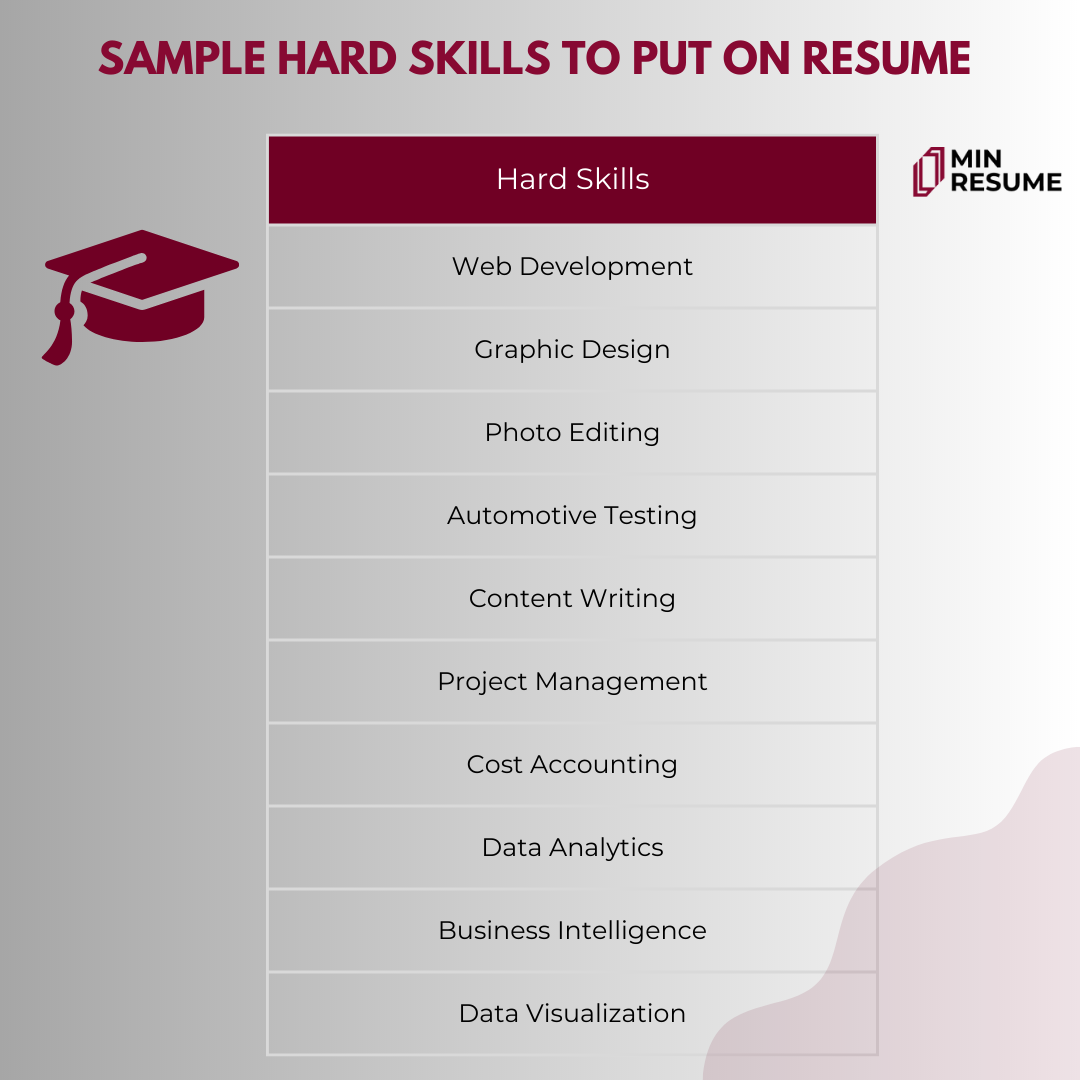
Hard skills are directly related to the job. They are the primary qualifications that gets you hired in the first place.
You can see in the picture some examples of hard skills. Anything that is required to perform a job primarily is a hard skill. For example, if you are applying for a web developer position, then your skills in building web applications are the hard skills. These include front end, back end development technics, programming languages, design patterns, web hosting, optimizing site performance etc. You get the point?
Oh, if you are wondering why team work is not considered a hard skill because developers are expected to speak with so many people as part of their work; since team work is not one of the primary skills required to deliver as a web developer, it is not a hard skill but a soft skill indeed. Also, please note that the list of soft skills can easily be at least a hundred-item long, but not all soft skills are going to be equally important. We will cover some aspects of these soft skills under the soft skill section. Read on.
If you are still on the fence, let us look at another example.
Imagine you have been working in the financial services industry in the mortgage process. Your hard skills are what makes you a mortgage processor. These may include underwriting processes, mortgage regulations like Real Estate Settlement Procedures Act (RESPA) and the Truth in Lending Act (TILA), loan processing software like Mortgage Cadence and some knowledge of DocuSign for document verification, etc. You could be wondering why communication is not a hard skill in this example as someone who works in the loans department is expected to talking to and working with so many people, but since communication is not one of the primary skills in the mortgage process, it is not a hard skill, but a soft skill.
In summary, any skill that is primarily required to perform the job, the one that deals with the actual nuts and bolts of a function, is a hard skill.
Exploring Soft Skills
Soft skills, on the other hand, are non-technical skills that are more related to interpersonal interactions and personal qualities. Also known as transferable skills or people skills, they are not specific to a particular job or industry. Soft skills encompass a range of attributes that enable individuals to effectively communicate, collaborate, problem-solve, and adapt to various situations. Examples of soft skills include communication, teamwork, leadership, critical thinking, time management, and emotional intelligence.
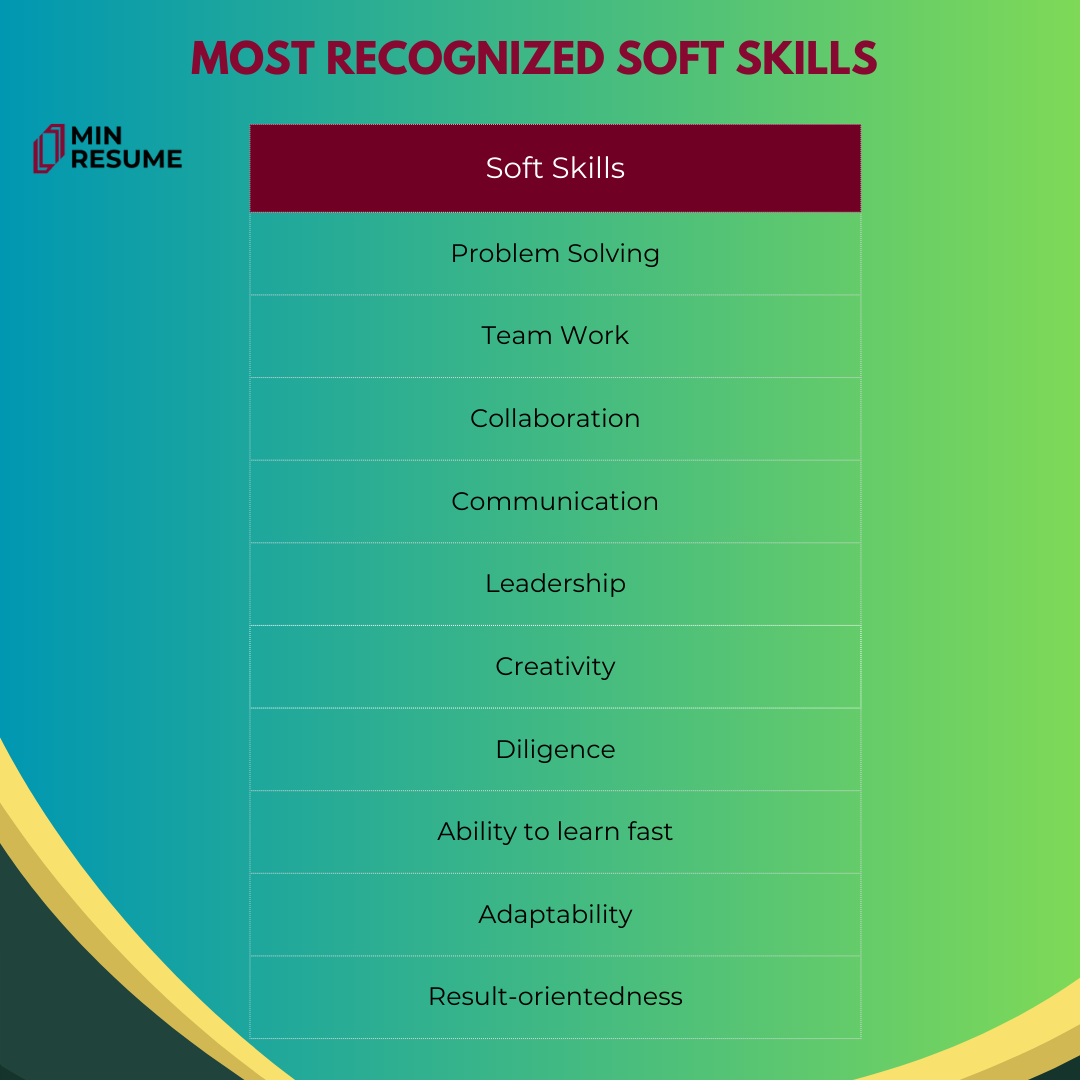
You can consider soft skills as the glue that binds all your hard skills together, bring them forward to produce the results you want to produce as a professional. In other words, soft skills are the ones that get you to work with your team members and stakeholders effectively. If you are a programmer and a great communicator, the employers will perceive of you as some who could potentially get the products out much faster than another programmer who might not be as good as you as a communicator.
Speaking of soft skills, the list of soft skills can be nearly endless as any skill other than hard skills can be basically soft skill. Skills like negotiation, conflict management, coaching, listening, mediating, time management, and presentation are all soft skills.
The resume templates we have created all follow these simple guidelines. If you have not checked them out, take a look at Resume Formats
If you are confused as to which soft skills to include on your resume, you should include those soft skills that the job description claims as important. You would want to pick top 4 or 5 of the soft skills that the job description claims to be critical.
The Importance of Balancing Hard and Soft Skills
While hard skills demonstrate your technical expertise and competence in a specific area, soft skills are equally important in the professional world. Employers seek candidates who possess a combination of both hard and soft skills. Hard skills may get you through the door, but it's the soft skills that often determine success in the workplace. Soft skills enhance your ability to work well with others, navigate challenges, and demonstrate professionalism. They contribute to your overall effectiveness, career advancement, and long-term success.
Imagine a situation where you are the hiring manager in your start-up that makes game apps for children, on Android and iOs and you are looking to hire a product manager. You come across two resumes – both have stellar qualifications such as agile certifications, demonstrated success at work as product managers and a list of technical skills; but, one resume has only technical skills and the other has communication, collaboration and team work under soft skills and also highlights these keywords under work experiences. Without even interviewing, you know you are going to pick the resume that has soft skills listed, right?
The point is, although it is very obvious that a great product manager would also possess great communication and team working skills, omitting the soft skills and explicitly calling out that the candidate possesses soft skills risks excessive reliance on the initial reviewer of your resume.
Especially given that it is a public secret that recruiters are usually very busy and often spend less than a few minutes reviewing resume, you want your profile to create a great first impression and show that you have all the skills needed for the job.
I hopet this makes it amply clear that you should include both soft and hard technical skills on your resume.
What is the difference between hard skills and soft skills
Hard Skills: These are the ones that are required to do what you want to do. In other words, without these skills, you cannot do what you want to do as a professional. Example: if you do not have programming skills, then you cannot be a programmer. If you cannot conduct pollution testing on automotives, then you cannot be a pollution tester. Another example – if you don’t have cooking skills, you cannot be a contestant in Master Chef Australia.
Another key difference is that hard skills can be learned quickly, at least relative to how long it can take to be decent with a soft skill. Additionally, the proficiency in hard skills can be measured easily by means of tests and technical interviews, again, in comparison with soft skills.
Soft Skills: Soft skills are those skills that help you be better in your hard skills. For example, if you a programmer, being a good team player helps you work effortlessly with your stakeholders like team members, managers, clients, etc. You can now understand why skills like collaboration, communication, problem solving and adaptability are all under soft skills. In other words, hard skills are the WHAT and soft skills are the HOW.
How you bring out the best in your technical skills is using the soft skills. Being balanced and having great soft skills that are complimentary to one’s hard skills is what makes one very successful in their career.
15 best skills to consider including on any resume
A well-crafted resume goes beyond listing your work experience and education. It should showcase a comprehensive set of skills that demonstrate your ability to excel in the workplace. These skills act as valuable assets, highlighting your qualifications and potential contribution to a prospective employer. While the specific skills needed may vary depending on the job and industry, there are 15 essential skills that are highly sought after by employers across various fields.
Listing these essential skills on your resume not only helps you stand out from other candidates but also conveys your readiness to tackle the challenges of the modern workplace. Let's explore these 15 essential skills and why they are valuable in today's job market.
As you can imagine, the soft skills that are essential to a job is a little bit harder to pin point given there are so many soft skills that might appear on a job description and all soft skills might seem equally important, but it is not so. Careful evaluation of the job description and the nature of the job can shed light on the soft skills essential to the job you are applying. Take the experienced recruiters words: we have seen in this article that 93% of recruiters say that soft skills are super important on your resume.
These 15 essential skills reflect the demands of the modern workplace, where employers seek well-rounded candidates who can adapt to changing environments, effectively communicate, collaborate with teams, and solve complex problems. By showcasing these skills on your resume, you demonstrate your readiness to contribute to an organization's success and make a positive impact in your role.
#1. Communication Skills
Effective communication skills encompass both verbal and written communication, active listening, presentation skills, and interpersonal skills.
These skills demonstrate your ability to convey information clearly, collaborate effectively with team members, and build strong professional relationships. Strong communication skills are essential in almost every job, as they facilitate understanding, prevent misunderstandings, and contribute to a positive work environment.
Communication skills is like the mother of all soft skills, and rightly it also includes the following skills –
- Verbal and written communication
- Active listening
- Presentation skills
- Interpersonal skills
#2. Leadership Skills
Leadership skills showcase your ability to guide, motivate, and influence others to achieve shared goals. They include skills such as team management, decision-making, delegation, and conflict resolution.
Possessing strong leadership skills demonstrates your potential to take charge, make informed decisions, inspire others, and drive positive change within an organization.
Following are a sub set of the leadership skills.
- Team management
- Decision-making
- Delegation
- Conflict resolution
#3. Problem-Solving Skills
Problem-solving skills are crucial in addressing challenges and finding effective solutions. They involve analytical thinking, critical reasoning, creativity, and adaptability. Strong problem-solving skills demonstrate your ability to analyze complex situations, think critically, and develop innovative strategies to overcome obstacles and achieve desired outcomes.
Following skills are a part of the problem-solving skills family.
- Analytical thinking
- Critical reasoning
- Creativity
- Adaptability
#4. Time Management
Time management skills showcase your ability to prioritize tasks, manage deadlines, and optimize productivity. These skills involve skills such as prioritization, goal setting, organization, and multitasking. Strong time management skills demonstrate your efficiency and effectiveness in managing your workload, meeting deadlines, and delivering results in a timely manner.
Time Management also covers the following skills as a sub set.
- Prioritization
- Goal setting
- Organization
- Multitasking
#5. Adaptability and Flexibility
Adaptability and flexibility are vital in today's ever-changing work environment. These skills demonstrate your openness to change, willingness to learn new technologies or processes, and ability to adapt to shifting circumstances. Employers value candidates who can embrace change, navigate uncertainty, and quickly adjust to new situations, as they contribute to organizational resilience and growth.
Adaptability and Flexibility also includes the following skills
- Openness to change
- Willingness to learn
- Resilience
- Embracing new technologies
#6. Teamwork and Collaboration
Teamwork and collaboration skills reflect your ability to work effectively with others to achieve common goals. These skills encompass building relationships, cooperation, diplomacy, and consensus-building. Strong teamwork and collaboration skills demonstrate your capacity to contribute positively to a team, communicate effectively, and leverage collective strengths to drive successful outcomes.
The following skills also fall under Teamwork and Collaboration.
- Building relationships
- Cooperation
- Diplomacy
- Consensus-building
#7. Customer Service
Customer service skills are essential for roles that involve direct interaction with clients or customers. These skills include patience, empathy, conflict resolution, and problem-solving. Strong customer service skills showcase your ability to understand and meet customer needs, address concerns or complaints, and provide a positive experience that enhances customer satisfaction and loyalty.
The following skills are part of the Customer Service skillset.
- Patience
- Empathy
- Conflict resolution
- Problem-solving
#8. Technical Skills:
Technical skills are specific to the job or industry and involve proficiency in relevant software, tools, programming languages, or technical expertise. These skills demonstrate your ability to handle the technical requirements of the role and leverage technology effectively. Including relevant technical skills on your resume showcases your competence and readiness to excel in a specific job or industry.
The following other broad skills also fall under Technical Skills.
- Proficiency in specific software or tools relevant to the job
- Programming languages
- Technical expertise required in the industry
#9. Project Management
Project management skills encompass planning, organizing, and executing projects successfully. These skills involve skills such as project planning, budgeting, resource allocation, and risk management. Strong project management skills demonstrate your ability to oversee projects, ensure timely completion, manage resources efficiently, and deliver high-quality results within defined constraints.
The following skills are all part of the Project Management family of skills.
- Planning and organization
- Budgeting
- Resource allocation
- Risk management
#10. Data Analysis
Data analysis skills involve collecting, interpreting, and drawing meaningful insights from data. These skills include data interpretation, statistical analysis, data visualization, and proficiency in data analysis tools. Strong data analysis skills are increasingly valuable in today's data-driven world, as they enable organizations to make informed decisions, identify trends, and drive business growth based on data-driven insights.
Skills such as the ones below are all part of Data Analysis skills. Depending on how the job decription refers to these skills, you might want to consider listing your skills accordingly.
- Data interpretation
- Statistical analysis
- Data visualization
- Proficiency in data analysis tools
#11. Creativity
Creativity showcases your ability to think innovatively, generate unique ideas, and approach problems from different perspectives. These skills include skills such as innovation, brainstorming, design thinking, and artistic abilities. Possessing strong creativity skills demonstrates your capacity to bring fresh perspectives, contribute to problem-solving, and drive innovation within the organization.
Creativity also includes the following skills. Read the job description for how creativity has been referred to as a skill and list your skills on the resume accordingly.
- Innovation
- Brainstorming
- Design thinking
- Artistic abilities
#12. Attention to Detail
Attention to detail is essential in ensuring accuracy, quality, and precision in work. These skills involve meticulous review, error identification, and thoroughness. Strong attention to detail skills showcase your ability to spot errors, maintain high standards of quality, and deliver work with precision and accuracy.
The following skills are all part of the Attention to Detail skillset.
- Accuracy
- Precision
- Thoroughness
- Meticulousness
#13. Problem Identification or Root Cause Analysis
Problem identification skills involve being proactive in identifying potential problems, risks, or opportunities. These skills include observation, research, and critical thinking. Possessing strong problem identification skills demonstrates your ability to anticipate challenges, identify areas for improvement, and take proactive measures to address them, contributing to organizational efficiency and growth.
Below are some of the skills that are considered part of the Root Cause Analysis family.
- Observational skills
- Research abilities
- Data gathering
- Critical thinking
#14. Decision-Making
Decision-making skills involve evaluating information, considering alternatives, and making informed choices. These skills include analytical thinking, critical reasoning, and risk assessment. Strong decision-making skills demonstrate your ability to assess situations, weigh the pros and cons, and make effective decisions that align with organizational goals.
As in the other skillsets we saw before, the following are part of the decision-making skillset.
- Information evaluation
- Strategic planning
- Risk assessment
- Developing vision and mission
#15. Networking
Networking skills encompass building and nurturing professional relationships. These skills involve effective communication, relationship-building, and leveraging social platforms or events. Possessing strong networking skills showcases your ability to establish connections, foster collaborations, and seize valuable opportunities that can contribute to your professional growth and success.
Networking is a vast area as a skill and rightly includes the following as manifestations of networking skills.
- Relationship building
- Communication skills
- Online presence
- Presence on professional networking platforms
How to list Skills on resume
Now that you have a good understanding of hard skills vs soft skills and the importance of including both on your resume, let us now move forward to understand how you can go about including skills in your resume.
Given there are so many skills we think we possess and we think a particular job description refers, a little bit of planning and diligent execution can go a long way in making your resume stellar.
Once you apply the ten-step process we are going to walk you through below, you will have a renowned understanding of your own skills and how to map them to various job descriptions you will encounter during your long career.
Don’t be daunted by the ten-step process. Anything worthwhile takes effort and meticulous planning. We just broke down the whole clunky process of identifying strengths and then map them to skills that are essential to a job. It’s the whole process we are talking about.
Step 1. Identify Relevant Skills
Start by identifying the skills that are most relevant to the job or industry you're applying for. Review the job description or research industry trends to understand the key skills employers are seeking.
The best resource available out there to find out what skills are relevant to the job is the job description itself. A job description is prepared by the employer who advertised for the open position, which you are applying to. It could be on a job site or the employer’s job portal or on linkedin. There is usually no job vacancy posting that does not come with a job description.
In case you are preparing a generic resume, focus on the skills relevant to the job in the industry in general since you would not know where your references would forward your resume to.
How to identify relevant skills
Read the job description carefully and the skills can be spotted easily. While the hard technical skills can be spotted immediately, soft skills could require some effort to spot them. It need not be an exhaustive exercise as you do not need to list down every single soft skill that are mentioned on the job description.
Since there is no standard way of writing job descriptions, you will have to read the whole job description to understand what skills are considered essential to the job being advertised.
You can see in the example but a real job description below for a Business Analyst position in a financial services organization there is a clear section on skills. Other job descriptions might call this section slightly differently such as “Required Qualifications”, “Preferred Qualifications”, “What you bring”, “Expectations”, etc.
Researching the job description to identify essential skills required
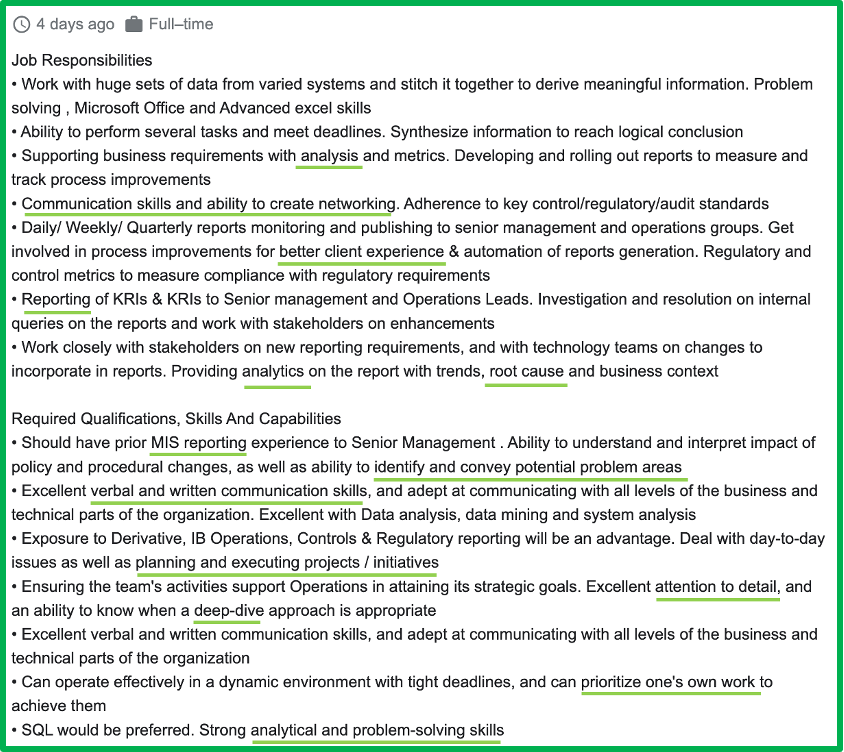
Even when the skills are called out under a separate section, it is still important to pay attention to the details so you find out which skills are more important than the others.
Usually, the skills that are more important are listed on top and the less important ones at the bottom. The ones at the top of the list are considered the most important and the candidate is expected to possess them. That’s the clue for you.
Going by this rationale, you can easily spot that the MIS Reporting, Analytics and Root Cause Analysis appear to be the most important hard or technical skills, and written and verbal communication, problem solving, and project management are the soft skills required.
It is also common for companies to use plain English to describe a soft skill. In this example, we see that “ability to identify and convey problem areas” is just the long form of “root cause analysis” and “communication”. Just read the job description a few times until you get a good sense of the various skills the company is looking for.
With this understanding, let’s move to creating the Skills section.
#2. Categorize skills under the skills section
You can create the skills section wherever you want on your resume as long as it is in a prominent place. Do not place the skills section at the end of the resume. Preferably, keep the skills section at the same level as your first section after career objective statement or your profile section. Depending on the style of your resume format, it can be on the left side or the side. Both would work.
Group your skills into relevant categories. For example, you can have sections for technical skills, soft skills, language proficiency, or specific industry-related skills. This helps employers quickly identify your areas of expertise. It is normal just to have two sections; one for hard skills and the other for soft skills. With the understanding you gained from researching the job description, list the skills under appropriate sections.
You do not need to include all the hard and soft skills you possess; just pick the ones that are on the job description and limit 5 under each category for maximum impact.
If your resume format does not allow you have two sections, you can combine both skills under one section and call it “Skills”. You should also consider incorporating the essential skills in your profile or career objective statement as that is one of the first sections recruiters and hiring managers will look at.
For the job description we looked at as an example, your resume will be considered brilliant by the recruiters if you listed your skills as below.
How to highlight skills on your resume
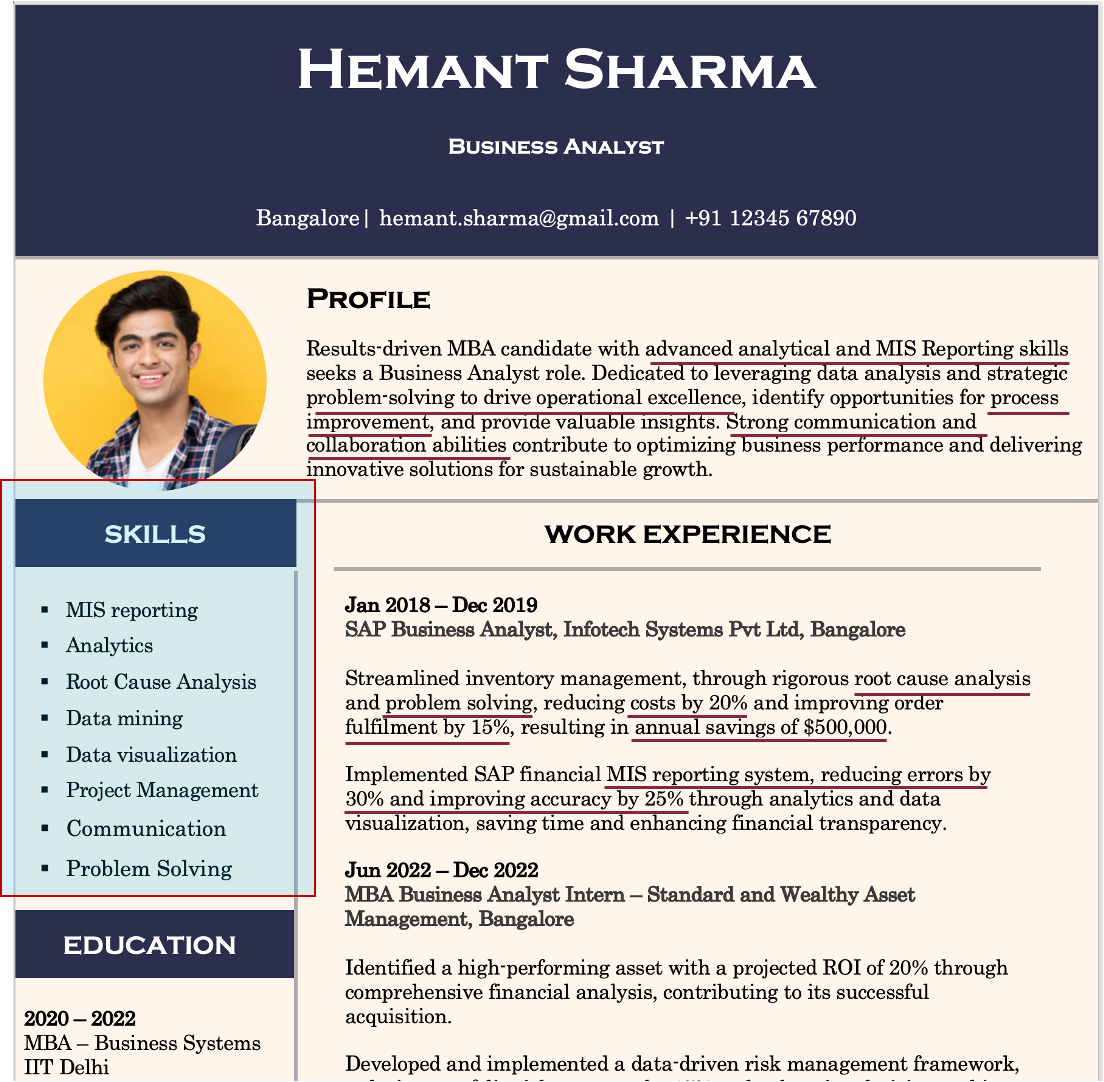
Step 3. Use Clear and Concise Language
When listing skills, use clear and concise language to describe them. Avoid using jargon or acronyms that may not be familiar to everyone. Be specific and use only language that is commonly used.
Here's an example of not using concise language while including a skill on a resume. Imagine this appearing in the profile section.
Before: "Innovative Thinking and Out-of-the-Box Problem-Solving Abilities Demonstrated Through Creative Approaches and Thinking Outside the Norm to Drive Innovation and Generate Unique Solutions."
While this sentence conveys the skill of innovative thinking and problem-solving, it is overly verbose and could be made more concise. Here's a revised and more concise version:
After: "I am an innovative problem-solver, applying creative approaches to drive innovation and generate unique solutions."
Two more examplesIt is better to mention “Project management” directly than “Task Coordination”, “Task Follow-up to closure”, “Workflow management”, etc.
Similarly, “communication” is direct and preferred and you should avoid using “language Proficiency”, “articulate”, “verbal and written communication” etc.
You can easily see that by condensing the language and focusing on the core message, the revised versions effectively communicates the skill in a clearer and more concise manner.
Step 4. Prioritize Skills
Place the most relevant and sought-after skills at the top of each category. This ensures that recruiters or hiring managers see your strongest skills first, increasing the chances of grabbing their attention.
Simply put, you should list the most important skills first. There is no way to find out which skill is number one, but the relative order can be easily spotted.
In the example we saw of a Business Analyst Job Description, it is clear to see how Analytics, MIS Reporting and Root Cause Analysis as the top the technical skills and communication and Problem Solving are the top soft skills.
Step 5. Provide Evidence
Whenever possible, provide evidence or examples of how you have utilized your skills in previous experiences. This could include mentioning specific projects, achievements, or outcomes that highlight your proficiency in a particular skill.
The first place where you would show you have the necessary technical and soft skills is your career objective statement or the profile section, which is usually the front, top and center of your resume.
For the example of a Business Analyst Job Description we have been referring to, a well-written career objective statement will look like this below. You can see how clearly the technical and soft skills jump out immediately and easily spotted.
How to highlight your skills on the career objective statement
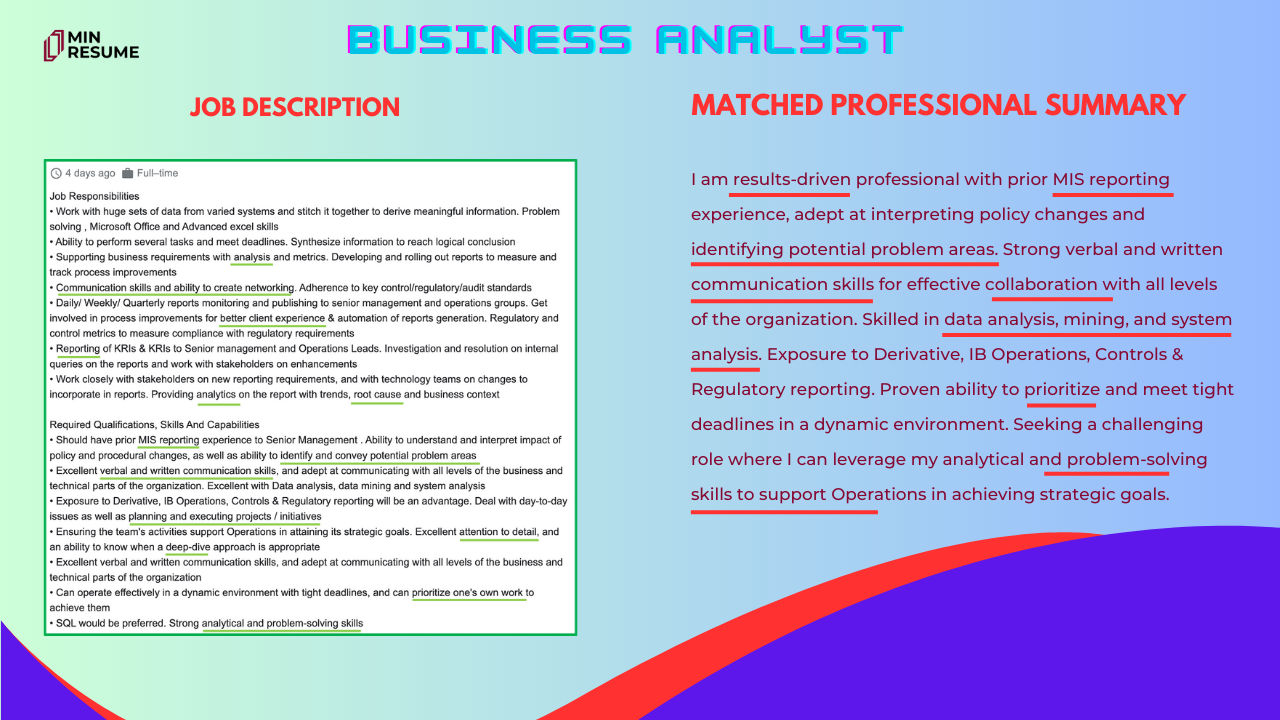
Similarly, a well-written career objective statement for a Java developer resume will look like below, highlighting relevant technical and soft skills.
Well-wriiten career objective statement for a Java developer
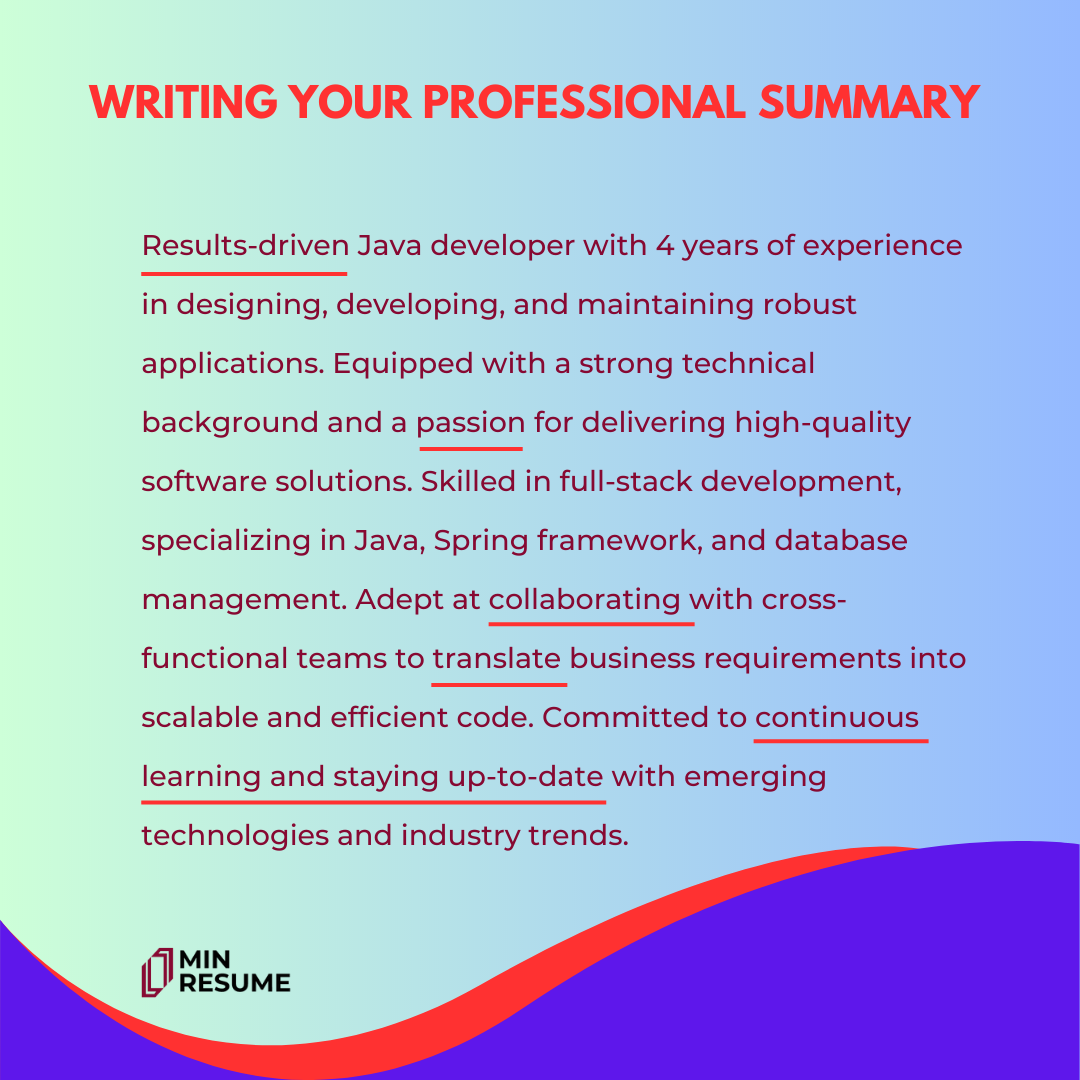
The profile summary or the career objective statement is not the only place where you should highlight your skills for maximum impact. The work experience section is the other area where you can highlight your skills and what you have achieved leveraging those skills. This is where you provide evidence that you have the skills you claim you have.
The work experience section is where you demonstrate how well you have used your skills to deliver results, and hence, the bullet points under work experience should not just list responsibilities that you shouldered but they should also communicate achievements.
Each of the bullets points should start with an action verb. We have written an exhaustive article on how to write your work experiences for maximum impact. You might want to give it a quick read.
Take a look at the example below. You can see that each of the listings under the work experience is clearly starting with an action verb and that each of the skills listed are quantified under work achievements. This is one of the best ways to demonstrate on your resume that you indeed possess the skills you claim to be possessing.
Linking skills to quantified achievements via action verbs
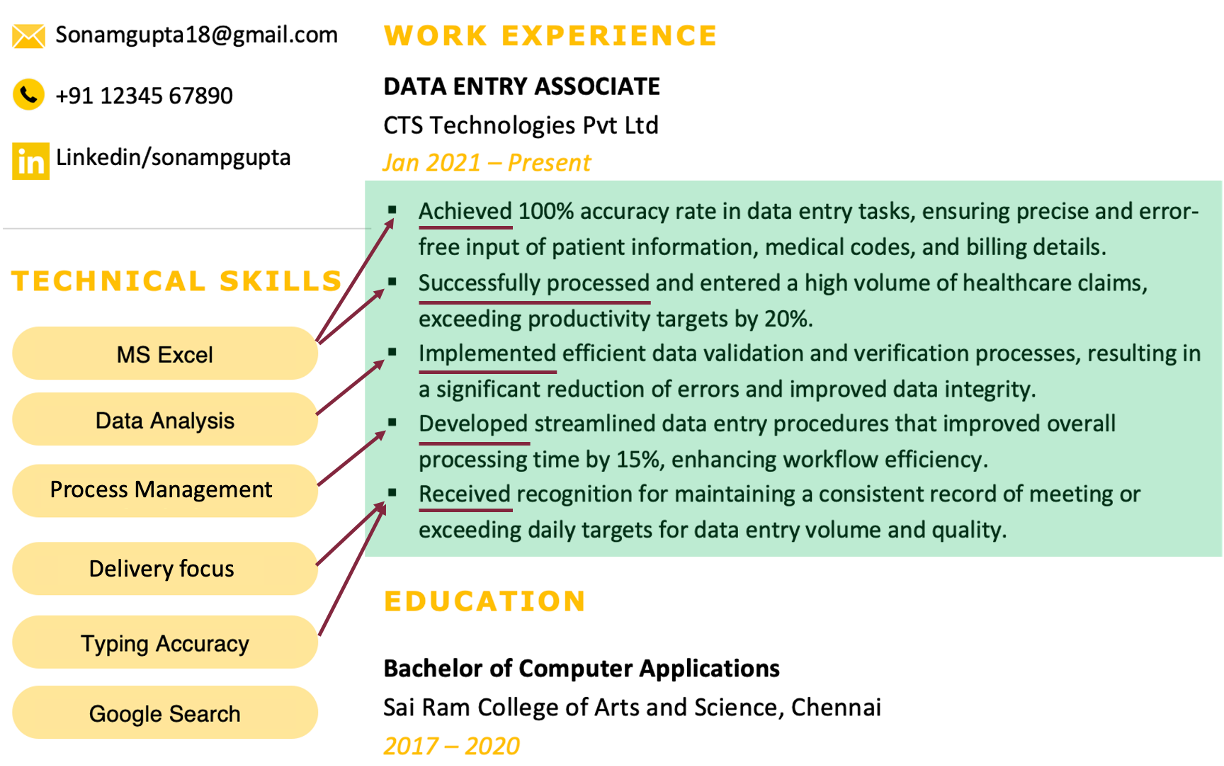
What are action verbs and why they are important on a resume
Action verbs in a resume play a crucial role in effectively communicating your skills, experiences, and achievements to potential employers. They provide a dynamic and impactful representation of your capabilities. Here's what action verbs signify in a resume:
1. Active Contribution: Action verbs convey that you actively contributed to projects, tasks, or initiatives. They demonstrate your proactive approach and ability to take ownership of responsibilities.
2. Skill Demonstration: Action verbs highlight the specific skills and abilities you possess. They showcase your expertise and showcase how you applied those skills in real-world situations.
3. Achievements and Results: Action verbs indicate the outcomes and results you achieved in your previous roles. They demonstrate your ability to produce tangible results and make a positive impact.
4. Engaging Writing: Using action verbs adds energy and dynamism to your resume. It creates engaging and compelling content that grabs the reader's attention and keeps them interested in your qualifications.
5. Clarity and Precision: Action verbs provide clarity and precision by clearly articulating your actions and accomplishments. They help paint a vivid picture of your abilities and experiences.
6. Differentiation: Well-chosen action verbs can help differentiate you from other candidates. They add a unique flair to your resume and make it more memorable to hiring managers.
Ten widely used action verbs that can enhance your resume:
- Achieved: Demonstrated successful outcomes, accomplishments, or goals you achieved.
- Managed: Oversaw and directed projects, teams, or resources.
- Developed: Created or improved processes, strategies, or products.
- Implemented: Executed plans, initiatives, or solutions.
- Led: Guided, supervised, or mentored individuals or teams.
- Resolved: Successfully addressed or solved problems, conflicts, or issues.
- Collaborated: Worked effectively with others to achieve common goals.
- Analyzed: Examined and evaluated data, situations, or information to derive insights.
- Increased: Enhanced or improved performance, productivity, efficiency, or results.
- Presented: Communicated information, ideas, or proposals in a clear and persuasive manner.
Step 6. Quantify Results
Whenever feasible, quantify the results or impact of your skills. For example, if you have project management skills, mention how you successfully completed projects on time and within budget, or if you have customer service skills, highlight how you improved customer satisfaction ratings.
When you list your work achievements, make sure to quantify the results you achieved. The example we looked at under point 5 holds good here. You can see how each of the achievements has been clearly quantified. It is usually better to avoid monetary figures in quantifying results. Percentage or a ratio based results are usually safe and helps with being fair with your current or past employers as some employers might mind your listing monetary results in the achievements. Same holds for updating your work history on social media platforms like linkedin.
Step 7. Tailor Skills to the Job
Customize your skills section for each job application. Review the job requirements and incorporate the skills that align closely with what the employer is seeking. This demonstrates your suitability for the specific role.
This point goes back to point 1 in a way. Our advice here is that candidates should revise the skills section and tailor to match every single job they are applying to. While the skills may remain the same for a similar job title, based on the culture of the organization, the order of the skills on the scale of importance could vary slightly between job descriptions. So, make the most of your research of the job description and include the most relevant skills first and then work your way down to the least of the relevant skills.
Step 8. Be Honest
Only include skills that you genuinely possess and can confidently discuss during an interview. Avoid exaggerating or misrepresenting your abilities, as it can lead to a negative impression if you're unable to showcase those skills in practice.
While it is sometimes normal for some of us to think we possess skills at a level greater than our true levels of mastery, there are ways in which we can ascertain our readiness to a job. One of the easiest ways is to go through technical self-assessments. There are lots of free assessments that are only a google away to find out where we stand. Another easier approach may be to speak with someone who is an expert in the domain and discuss to find our true level of mastery.
We see that a lot of candidates self-rank them on a scale of 1-10 or 1-5 or 1 – 5 stars on the resume. We would recommend against using such self-evaluations on your resume especially for the same reason that they are self-evaluations and hold little value to the recruiter.
Step 9. Keep it Relevant
Focus on skills that are directly applicable to the job you're applying for. While it's good to have a diverse skill set, prioritize those that are most relevant and valuable in the context of the position you're targeting.
We have already extensively covered this point. You might have skills that are stronger than the ones that are most critical to the job, but do not be templated to list your top most strengths over the skills that are most critical to the job you are applying to. If the skills you are most strong at are somewhat relevant to the job you are applying to, then you can include them at the end of the list. Focus on relevance and include in your resume only those skills that are absolutely relevant to the job.
Step. 10. Update Regularly
Keep your skills section up to date by reviewing and adding new skills as you acquire them. Stay current with industry trends and evolving skill requirements to ensure your resume remains relevant and competitive.
This point is related to point 7 on tailoring your skills to the jobs you apply. As you continue to add new skillsets and gain more mastery on your existing skillsets, your resume should also be updated periodically.
One tip we would like to share is that you set up a meeting on your for a resume review; be meticulous about keeping with this schedule. During this 1 hour every six months, review your resume end to end and revise for the most recent updates, including your position, skillsets, certifications, etc. You will thank yourself for doing this periodic resume reviews when you are in the job market the next time. An inadvertent side effect of this self-resume review is you will spot immediately if you have not added new skillsets since the last review and that should be a great motivator for you to take up learning a new skill a little more seriously.
Ready to use modern resume templates
We have simplified the resume creation process for both fresh graduates and experienced professionals by showing examples how to list skills, work experiences, project experiences and hobbies and interests for a variety of jobs and functions. You can find some of them below.
100+ must have skills for every job
We have assembled a list of skills across various common functions so you can scan through the list and see which ones might be relevant for you to highlight on the resume.
Remember, you should always marry these skills with the ones you see on the job description before you submit your resume via email or on any of the job sites.
#1. Soft Skills
We have already discussed this at length earlier. Hard skills alone won’t make the cut. You should have both hard technical and soft skills on your resume.
Like we said earlier, soft skills are the ones that helps you bring your hard technical skills to the fore and make you an effective professional. It is important to highlight those critical soft skills to create the best first impression on the recruiters and hiring managers.
Below you will find the most commonly referenced soft skills.
- Communication
- Leadership
- Teamwork
- Problem-solving
- Adaptability
- Time management
- Creativity
- Critical thinking
- Collaboration
- Emotional intelligence
- Conflict resolution
- Decision-making
- Flexibility
- Interpersonal skills
- Organizational skills
#2. Management skills
Below is the list of most commonly used management skills on resumes across functions and industries.
- Leadership
- Strategic planning
- Decision-making
- Team building
- Performance management
- Conflict resolution
- Communication
- Problem-solving
- Delegation
- Coaching and mentoring
- Change management
- Budgeting and financial management
- Project management
- Relationship management
- Negotiation
#3. Business Analytics skills
These business analytics skills are highly relevant in today's data-driven business environment. When highlighting these skills on your resume, consider providing examples of projects or initiatives where you have applied these skills and achieved meaningful outcomes, such as improved efficiency, cost savings, or strategic insights for the organization.
- Data analysis
- Statistical analysis
- Data visualization
- Predictive modeling
- Business intelligence
- Data mining
- Data interpretation
- SQL database querying
- Data storytelling
- Excel proficiency
- Data-driven decision making
- Reporting and dashboards
- Data cleansing and preprocessing
- Quantitative research
- Machine learning
#4. Sales skills
These sales skills are essential for success in roles that involve selling products or services. When highlighting your sales skills on your resume, consider providing specific examples of achievements, such as exceeding sales targets, winning new clients, or building long-term customer relationships. Demonstrating your proficiency in these skills can showcase your ability to drive revenue growth and contribute to the success of a sales team or organization.
- Prospecting
- Relationship building
- Communication
- Negotiation
- Closing deals
- Product knowledge
- Presentation skills
- Customer service
- Consultative selling
- Territory management
- Sales forecasting
- Lead generation
- CRM proficiency
- Account management
- Competitive analysis
#5. Operations skills
These operations skills are highly valued in roles that involve managing and optimizing business operations. When showcasing your operations skills on your resume, consider providing specific examples or achievements that demonstrate your ability to streamline processes, reduce costs, improve quality, and enhance overall operational performance. Highlighting your proficiency in these skills can showcase your ability to drive operational excellence and contribute to the success of an organization.
- Process improvement
- Supply chain management
- Inventory management
- Quality assurance
- Project management
- Budgeting and cost control
- Lean methodology
- Performance metrics tracking
- Risk management
- Vendor management
- Operational efficiency
- Cross-functional collaboration
- Logistics and distribution
- Workflow optimization
- Continuous improvement
#6. Web development
These web development skills are highly relevant in roles that involve creating and maintaining websites and web applications. When highlighting your web development skills on your resume, consider providing specific examples or projects that showcase your proficiency in these skills. Demonstrating your experience with different programming languages, frameworks, and tools can demonstrate your ability to build functional and visually appealing websites and contribute to web development projects effectively.
- HTML
- CSS
- JavaScript
- Responsive web design
- Front-end frameworks (e.g., React, Angular, Vue.js)
- Back-end development (e.g., Node.js, Python, Ruby)
- Database management (e.g., SQL, MongoDB)
- API integration
- Version control (e.g., Git)
- Testing and debugging
- Cross-browser compatibility
- Performance optimization
- User experience (UX) design
- Web security
- Content management systems (e.g., WordPress, Drupal)
#7. Data Science skills
These data science skills are highly relevant in roles that involve analyzing and interpreting complex data sets to derive insights and make informed business decisions. When showcasing your data science skills on your resume, consider providing specific examples of projects or analyses where you have applied these skills and achieved meaningful outcomes. Highlighting your proficiency in these skills can demonstrate your ability to extract valuable insights from data and contribute to data-driven decision-making processes.
- Python or R programming
- Data manipulation and preprocessing
- Statistical analysis
- Machine learning algorithms
- Data visualization
- Predictive modeling
- Natural language processing (NLP)
- Deep learning
- Feature engineering
- Data storytelling and visualization
- Big data technologies (e.g., Hadoop, Spark)
- SQL database querying
- Experiment design and A/B testing
- Time series analysis
- Data ethics and privacy
#8. Internship skills
These internship skills are essential for successfully navigating and contributing to an internship experience. They demonstrate your ability to work effectively in a professional environment, collaborate with colleagues, and adapt to new challenges.
When highlighting your internship skills on your resume, provide specific examples of how you have applied these skills in previous internships or relevant experiences.
- Adaptability
- Time management
- Teamwork
- Communication
- Problem-solving
- Attention to detail
- Organizational skills
- Research and analytical skills
- Initiative and self-motivation
- Professionalism
- Flexibility
- Interpersonal skills
- Networking
- Learning agility
- Project management
#9. Finance skills
Here is a list of 15 skills you should consider including on your resume when you are applying to finance jobs.
- Financial analysis
- Budgeting and forecasting
- Financial modeling
- Risk management
- Investment analysis
- Financial reporting
- Accounting principles
- Data analysis and interpretation
- Market research
- Financial planning
- Valuation techniques
- Business strategy
- Excel proficiency
- Financial software (e.g., Bloomberg, SAP)
- Compliance and regulatory knowledge
These finance skills are crucial for roles in the finance industry, including finance analysts, financial advisors, and investment bankers. When highlighting your finance skills on your resume, provide specific examples of projects or achievements that demonstrate your proficiency in these skills and your ability to contribute to financial decision-making and analysis.
#10. Accounting skills
Here is a list of 15 commonly used accounting skills on resumes:
- Financial statement analysis
- Budgeting and forecasting
- General ledger management
- Tax preparation and compliance
- Auditing
- Accounts payable and receivable
- Financial reporting
- Cost accounting
- Payroll processing
- Internal controls
- Inventory management
- Risk assessment and management
- Financial software proficiency (e.g., QuickBooks, SAP, Oracle)
- Regulatory compliance (e.g., GAAP, IFRS)
- Data analysis and interpretation
These accounting skills are essential for roles in accounting and finance, such as accountants, financial analysts, and auditors. When showcasing your accounting skills on your resume, consider providing specific examples of projects or tasks where you have utilized these skills to achieve accurate financial reporting, identify cost-saving opportunities, or ensure compliance with accounting regulations. Highlighting your proficiency in these skills can demonstrate your ability to handle financial data, perform complex analyses, and contribute to sound financial decision-making.
#11. Marketing skills
These marketing skills are crucial for roles in marketing and communications, such as marketing coordinators, digital marketing specialists, and brand managers. When highlighting your marketing skills on your resume, provide specific examples of campaigns, strategies, or projects where you have utilized these skills to achieve marketing objectives, drive customer engagement, or improve brand visibility.
- Market research and analysis
- Digital marketing (SEO, SEM, social media marketing)
- Content creation and management
- Branding and brand management
- Marketing strategy development
- Customer relationship management (CRM)
- Campaign planning and execution
- Analytics and data interpretation
- Email marketing
- Lead generation and conversion
- Marketing automation
- Copywriting and editing
- Event planning and management
- Competitive analysis
- Public relations
#12. Testing skills
These testing skills are essential for roles in software testing and quality assurance. When highlighting your testing skills on your resume, provide specific examples of testing projects or experiences where you have employed these skills to identify and resolve software defects, improve product quality, or ensure the smooth functioning of software applications.
- Test planning and strategy
- Test case development and execution
- Test automation
- Defect tracking and management
- Regression testing
- Performance testing
- User acceptance testing (UAT)
- Test environment setup and configuration
- Test documentation and reporting
- Test data management
- Quality assurance processes
- Agile testing methodologies
- Exploratory testing
- Cross-browser and cross-device testing
- Continuous integration and delivery (CI/CD) testing
Conclusion
Incorporating relevant skills into your resume is a crucial step towards standing out in today's competitive job market. Throughout this article, we've explored ten essential steps to help you effectively showcase your skills and make a strong impression on potential employers.
By carefully selecting and presenting your skills, utilizing concise and action-oriented language, and providing specific examples of how you've applied these skills in real-world scenarios, you can demonstrate your value and suitability for the desired role.
Remember, tailoring your skills to match the job requirements and focusing on both hard and soft skills will create a well-rounded representation of your capabilities. Don't forget to quantify your accomplishments whenever possible to provide concrete evidence of your abilities.
Lastly, be prepared to discuss your skills during interviews and demonstrate how they align with the organization's goals and values. By confidently articulating the value you bring through your skills, you'll enhance your chances of securing the job you desire.
If you have any questions or need further guidance on adding skills to your resume, don't hesitate to reach out. We're here to support you in your job search and help you present your skills effectively. Best of luck on your career journey!
Did you enjoy this article? Then these below might also be of interest to you
1. Resume writing demystified - One of our most popular articles that goes through a lot of misconceptions and clarifies them.
2. Resume format for freshers - If you are a recent college graduate, you would enjoy reading this article as it would provide you with information specific to preaparing your first resume.
3. 50 Hobbies and Interests to put on your resume - If you wondered what hobbies and interests you should put on your resume, this article can help you become more strategic about this fun topic.
